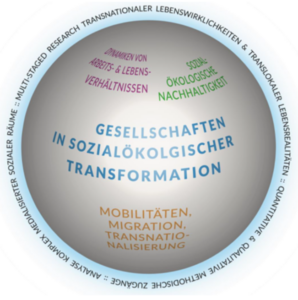Research at the Department of Sociology and Human Geography
 The dynamics of globalized societies involve uneven development and transformation processes. These are reflected in different paths of modernization, new centre-periphery structures, extended spatial/temporal demarcation phenomena and changing geopolitical power structures. The department analyzes the multi-layered consequences of these dynamics in their interwoven scales. They shape individual living conditions, characterize current working and living conditions, and permeate the shaping of late modern biographies and identities.
The dynamics of globalized societies involve uneven development and transformation processes. These are reflected in different paths of modernization, new centre-periphery structures, extended spatial/temporal demarcation phenomena and changing geopolitical power structures. The department analyzes the multi-layered consequences of these dynamics in their interwoven scales. They shape individual living conditions, characterize current working and living conditions, and permeate the shaping of late modern biographies and identities.
The main focus of the new department, which combines the existing fields of sociology and social and economic geography, is the study of societies in their unequal developments in the course of current socio-ecological transformations. This is the central research agenda of the new Department of Sociology and Social Science Geography. We pursue a dynamic, relational and intertwined approach to social and physical space. We therefore see the cooperation between sociology and social science geography not as complementary, but as constitutive for the new department. This structure results in a unique selling point in the Austrian university landscape and at the same time a highly topical research potential for relevant socio-political issues.
The future central research perspectives of the new department are: social and economic sustainability; mobilities, migration and transnationalization in and beyond Europe; and dynamics of working and living conditions.
Parallel to these three main research areas, there are two cross-cutting topics. We are developing and working on innovative methodological approaches (both in quantitative and qualitative research) in order to shed light on these dynamics empirically. In addition, digitalization dynamics from a social science perspective are also taken into account in our research approaches, because they are currently in a position to intensively influence and change the structure and dynamics of social organization in spatial, temporal and social terms. The digital transformation is taken up both in the investigation of our research topics and in our empirical approaches, as it plays a major role in the application and development of innovative methodology and methods.





